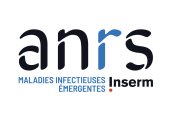A promising vaccine against Nipah virus infection
 |
 |
 |
PRESS RELEASE
Paris, 11 March 2024
The WHO recently classified the Nipah virus (NiV) as one of the eight main emerging pathogens likely to cause major epidemics in the future. In a context where no treatment or vaccine is yet available, a team comprising researchers from Inserm (Unit 955-VRI) and from the Université Paris-Est Créteil (UPEC) is presenting the preclinical results of an innovative vaccine against this virus. Most candidate vaccines target the viral surface proteins required for entry into human cells. To develop its new vaccine, the team at the VRI (Vaccine Research Institute of the ANRS MIE/Inserm) focused on the central role played by antigen-presenting cells (APCs) in the development of protective responses. The candidate vaccine, called CD40.NiV, carries specific parts of the surface proteins of the NiV-B virus, the Bangladesh strain. Following infection with the Nipah virus in animals, CD40.NiV demonstrated immunogenicity, neutralisation and complete protection, representing an important step towards the clinical development of a vaccine against the infection. The results of this work have just been published in the March 2024 issue of Cell Reports Medicine (https://doi.org/10.1016/j.xcrm.2024.101467).
The Nipah virus (NiV) is a zoonotic virus, meaning it is transmitted from animals to humans. However, it can also be transmitted via contaminated food or directly between individuals. The clinical presentation can range from asymptomatic infection to acute respiratory infection to fatal encephalitis. First identified in Malaysia in 1999, the virus has since spread regularly through outbreaks in Bangladesh and India. Mortality linked to these outbreaks is estimated to be between 75% and 90%.
The virus has recently been included on the WHO list of priority emerging pathogens. There is currently no approved treatment or vaccine. Numerous candidate vaccines are under study or development. Most target the G and F proteins on the surface of the virus, which are necessary for it to enter human cells and spread throughout the body.
The teams at Inserm and UPEC have developed an original approach involving antigen-presenting cells (APCs), in particular dendritic cells, which play an important role in the immune response. To construct the CD40.NiV vaccine, specific parts (or epitopes) of the G, F and N proteins of the Bangladesh strain of Nipah virus (NiV-B) were attached to an antibody recognising the CD40 receptors on the surface of dendritic cells. The epitopes are thus presented directly to the cells of the immune system.
Immunogenicity (the ability to induce an immune response) of the vaccine was assessed in mice and non-human primates after two administrations of CD40.NiV vaccine (the so-called “prime-boost” strategy). As early as 10 days after the first vaccination with CD40.NiV (prime), NiV-specific IgG and IgA antibodies, as well as neutralising antibodies (specific antibodies that prevent infection by blocking viral entry into target cells) were produced. The neutralising antibody response is maintained for at least 100 days after the peak of the immune response. In addition, the team showed that the antibodies induced against NiV also neutralise various strains of NiV (Malaysia, Cambodia) and the Hendra virus (this is known as cross-neutralising immunity), an infectious agent transmitted by bats and causing a highly fatal infection in horses and humans.
To ensure that the vaccine was effective, the animals were infected with the NiV virus 60 days after the second injection of CD40.NiV (boost). Protection was complete.
This preclinical study demonstrated that the CD40.NiV vaccine candidate confers protection against the development of Nipah virus, with 100% survival of immunised animals until the end of the study, 28 days after infection. The absence of significant clinical signs or virus replication suggests that the candidate vaccine provides ‘sterilising immunity’, meaning that it can prevent the disease and its transmission. Overall, results obtained with CD40.NiV are highly promising for fighting NiV infection and represent an important milestone towards the clinical development of a vaccine against this virus.
Reference : Pastor Y (1, 2), Reynard O (3), Iampietro M (3), Surenaud M (1, 2), Picard F (1, 2), El Jahrani N (1, 2), Lefebvre C (1, 2), Hammoudi A (1, 2), Dupaty L (1, 2), Brisebard E (4), Reynard S (3, 5), Moureaux E (6), Moroso M (7), Durand S (3), Gonzalez C (3), Amurri L (3), Gallouet A-S (8), Marlin R (8), Baize S (3, 5), Chevillard E (7), Raoul H (7), Hocini H (1, 2), Centlivre M (1, 2), Thiébaut R (2, 9, 10), Horvat B (3), Godot V (1, 2), Levy Y (1, 2, 11)*, Cardinaud S (1, 2)*. A vaccine targeting antigen presenting cells through CD40 induces protective immunity against Nipah disease. Cell Reports Medicine 2024,5 :101467
- Inserm U955 – Team 16, Vaccine Research Institute (VRI), Institut Mondor de Recherche Biomédicale (IMRB), Université Paris-Est Créteil (UPEC), Créteil, France
- Vaccine Research Institute (VRI), Créteil, France
- Centre International de Recherche en Infectiologie (CIRI), University of Lyon, INSERM U1111, Ecole Normale Supérieure de Lyon, University of Lyon 1, CNRS UMR5308, Lyon, France
- INRAE Oniris UMR0703, APEX, Nantes, France
- Biology of Emerging Viral Infections Unit, Institut Pasteur, Lyon, France
- BioPRIM, Baziège, France
- Laboratory P4 INSERM-Jean Mérieux, INSERM US003, Lyon, France
- Center for Immunology of Viral, Auto-immune, Hematological and Bacterial diseases (IMVAHB/IDMIT), Université Paris-Saclay, Inserm, CEA, Fontenay- aux-Roses, France
- Univ. Bordeaux, Department of Public Health, Inserm Bordeaux Population Health Research Centre, Inria SISTM, Bordeaux, France
- CHU Bordeaux, Department of Medical information, Bordeaux, France
- Assistance Publique-Hôpitaux de Paris, Groupe Henri- Mondor Albert-Chenevier, Service Immunologie Clinique, Créteil, France
* Co-authors
About the ANRS MIE: The ANRS Emerging Infectious Diseases (MIE), created on 1 January 2021, is an autonomous Inserm agency headed by Professor Yazdan Yazdanpanah. Its remit is to lead, evaluate, coordinate and fund research into HIV/AIDS, viral hepatitis, sexually transmitted infections, tuberculosis and emerging and re-emerging infectious diseases (in particular emerging respiratory infections – including Covid-19 – viral haemorrhagic fevers and arboviruses). Under the authority of the France’s Ministry of Higher Education and Research and Ministry of Health and Prevention, the ANRS MIE federates an interinstitutional network of national and international physicians and researchers, patient organisations and civil society representatives, all fully involved in theagency’s governance and operation. This dynamic co-construction guarantees project implementation in line with the expectations of the affected communities, and aims to limit the health, economic and social impact of epidemics. The Agency’s vaccine research programme is led by the Vaccine Research Institute (VRI).
For more information: https://www.anrs.fr
About the VRI and Inserm: The Vaccine Research Institute (VRI), Laboratory of excellence, was established by Inserm (French National Institute of Health and Medical Research) and the University of Paris-Est Créteil (UPEC) to conduct research to accelerate the development of effective vaccines against HIV/AIDS and (re)-emerging infectious diseases. The VRI’s structure strengthens the links between basic research and translational research, patients associations and the socio-economic world. The VRI extends a network of internationally renowned scientists and research teams with multidisciplinary expertise in system biology and clinical immunology, a network of clinical centres, shared platforms.
For more information: https://vaccine-research-institute.fr/”>//vaccine-research-institute.fr/
Founded in 1964, Inserm is a public scientific and technological institute dedicated to biomedical research and human health, and is involved in the entire range of activities from the laboratory to the patient’s bedside. It also partners with the most prestigious research institutions in the world that are committed to scientific challenges and progress in these fields.
For more information: https://www.inserm.fr/
About Université Paris-Est Créteil: With 14 faculties, schools and institutes, 1 observatory and 32 research laboratories, Université Paris-Est Créteil has been active in all fields of knowledge since 1970. Each year, UPEC trains over 42,000 students and working professionals of all ages.
A major player in the dissemination of academic, scientific and technological knowledge, the university offers more than 500 training courses in all disciplines and at all levels. UPEC offers personalized support for all successes, thanks to undergraduate and graduate training, recognition of prior learning and lifelong learning opportunities. Furthermore, the university runs a growing number of apprenticeship programs in order to stimulate entrepreneurship and ease professional integration.
Université Paris-Est Créteil has built its strategic plan around three strategic orientations: UPEC is an engaged university that aims to match academic excellence with societal relevance. It encourages and supports all paths of students’ success with dedicated programs. UPEC masters its trajectory and is a university open to the world and its diversity.
For more information: https://www.u-pec.fr/
Press contact: ANRS MIE